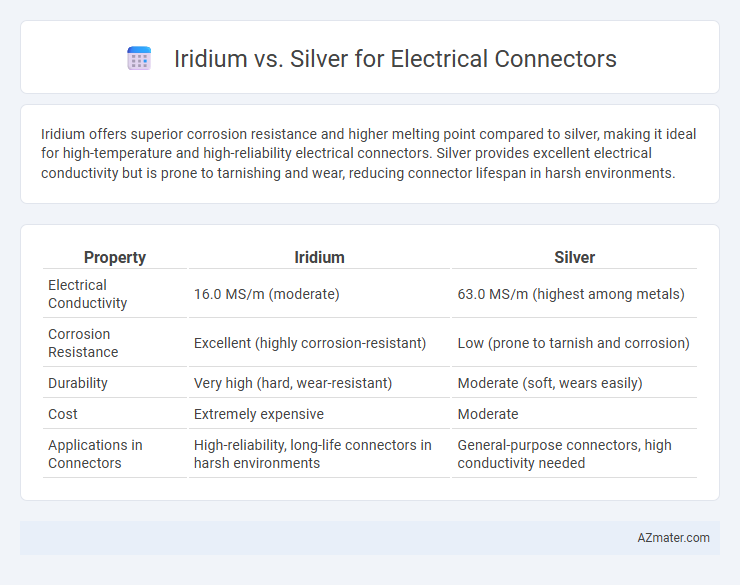Iridium offers superior corrosion resistance and higher melting point compared to silver, making it ideal for high-temperature and high-reliability electrical connectors. Silver provides excellent electrical conductivity but is prone to tarnishing and wear, reducing connector lifespan in harsh environments.
Table of Comparison
| Property | Iridium | Silver |
|---|---|---|
| Electrical Conductivity | 16.0 MS/m (moderate) | 63.0 MS/m (highest among metals) |
| Corrosion Resistance | Excellent (highly corrosion-resistant) | Low (prone to tarnish and corrosion) |
| Durability | Very high (hard, wear-resistant) | Moderate (soft, wears easily) |
| Cost | Extremely expensive | Moderate |
| Applications in Connectors | High-reliability, long-life connectors in harsh environments | General-purpose connectors, high conductivity needed |
Introduction to Electrical Connectors
Electrical connectors require materials with excellent conductivity, corrosion resistance, and durability to ensure reliable signal transmission and power delivery. Iridium, known for its exceptional corrosion resistance and hardness, offers superior performance in harsh environments but comes at a higher cost compared to silver. Silver delivers the highest electrical conductivity among metals, making it a preferred choice for low-resistance connections, although it is more prone to tarnishing under certain conditions.
Overview of Iridium and Silver Properties
Iridium exhibits exceptional corrosion resistance, high melting point (2446degC), and strong mechanical hardness, making it ideal for durable electrical connectors in harsh environments. Silver offers the highest electrical conductivity (approximately 63 x 10^6 S/m) and excellent thermal conductivity but has lower hardness and is prone to tarnishing. The choice between iridium and silver depends on balancing conductivity requirements with environmental durability and mechanical strength.
Conductivity Comparison: Iridium vs Silver
Silver exhibits superior electrical conductivity with a value of approximately 63 x 10^6 S/m, making it the best conductor among metals used for electrical connectors. Iridium has significantly lower conductivity, around 2.3 x 10^6 S/m, but offers exceptional corrosion resistance and mechanical strength, which can enhance connector durability in harsh environments. Silver connectors deliver optimal electrical performance, while iridium is preferred in specialized applications requiring long-term stability and resistance to wear.
Corrosion Resistance and Durability
Iridium offers superior corrosion resistance compared to silver, making it ideal for electrical connectors exposed to harsh environments or high temperatures. Its exceptional durability ensures long-term performance without significant degradation, whereas silver, despite excellent conductivity, is prone to tarnishing and oxidation that can compromise connection integrity. This makes iridium a preferred choice for critical applications requiring robust and reliable electrical contacts.
Cost Analysis: Iridium vs Silver
Iridium electrical connectors exhibit a significantly higher material cost compared to silver due to iridium's rarity and complex extraction process. Silver offers a more cost-effective solution with excellent conductivity and relatively low market price, making it suitable for budget-sensitive applications. However, iridium provides superior corrosion resistance and durability, potentially reducing long-term maintenance expenses despite the initial higher investment.
Thermal Conductivity Differences
Iridium exhibits significantly lower thermal conductivity compared to silver, with iridium's value around 147 W/m*K while silver's reaches approximately 429 W/m*K at room temperature. This difference affects heat dissipation in electrical connectors, making silver a superior choice for applications requiring efficient thermal management. However, iridium's higher melting point and corrosion resistance provide advantages in environments where thermal stability and durability are critical despite its lower thermal conductivity.
Application Suitability for Each Material
Iridium connectors excel in high-temperature, high-corrosion environments due to their exceptional oxidation resistance and mechanical strength, making them ideal for aerospace, automotive sensors, and harsh industrial settings. Silver connectors offer superior electrical conductivity and lower contact resistance, which suits low-voltage, high-frequency, and sensitive electronic devices such as telecommunications and precision instruments. The choice between iridium and silver hinges on specific application requirements, balancing durability against electrical performance to optimize connector reliability and efficiency.
Environmental and Safety Considerations
Iridium offers exceptional corrosion resistance and high melting point, making it ideal for electrical connectors used in harsh environments with exposure to chemicals and extreme temperatures. Silver provides superior electrical conductivity but is prone to tarnishing and oxidation, potentially leading to safety concerns due to increased resistance and potential connection failure. Environmental considerations favor iridium for its durability and reduced maintenance needs, while silver's mining and processing pose higher ecological and health risks due to toxic byproducts.
Performance in High-Stress Environments
Iridium offers superior corrosion resistance and excellent conductivity, making it ideal for high-stress electrical connectors exposed to extreme temperatures and harsh chemical conditions. Silver, while having the highest electrical conductivity of all metals, is prone to tarnishing and degradation under stress, which can impair long-term performance in demanding environments. Iridium's robust mechanical strength and stability under stress ensure reliable electrical connectivity where silver connectors may fail.
Conclusion: Choosing the Right Material for Electrical Connectors
Iridium offers superior corrosion resistance and excellent conductivity, making it ideal for high-performance electrical connectors in extreme environments. Silver provides the highest electrical conductivity and cost-effectiveness but is prone to tarnishing and wear under harsh conditions. Selecting between iridium and silver depends on balancing conductivity needs, environmental durability, and budget constraints for optimal connector performance.

Infographic: Iridium vs Silver for Electrical Connector
 azmater.com
azmater.com